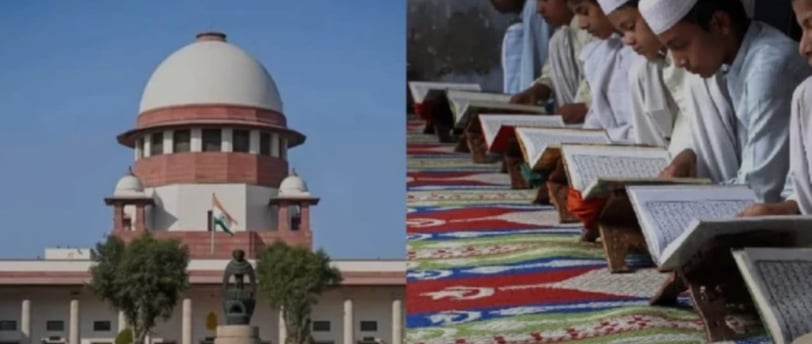Supreme Court upholds Uttar Pradesh Madarsa Education Act, except provisions regulating higher education degrees.
The Supreme Court upheld the Uttar Pradesh Board of Madarsa Education Act 2004, with exceptions. The court validated the Act's regulatory framework for madarsa education, ensuring students achieve competency. However, provisions regulating higher education degrees ('fazil' and 'kamil') were deemed unconstitutional, conflicting with the UGC Act.
11/5/20242 min read


The Supreme Court upheld the Uttar Pradesh Board of Madarsa Education Act 2004, with exceptions. The court validated the Act's regulatory framework for madarsa education, ensuring students achieve competency. However, provisions regulating higher education degrees ('fazil' and 'kamil') were deemed unconstitutional, conflicting with the UGC Act.
- Madarsa Act's regulatory framework upheld
- Higher education degree provisions struck down
- Act protects minority rights and secularism
- Legislative competence falls under state purview
The ruling balances minority rights with secularism and legislative competence, safeguarding madarsa education while maintaining India's educational framework integrity. The Supreme Court's decision overturns the Allahabad High Court's previous judgment striking down the Act.
Website content
On November 5, 2024, the Supreme Court upheld the constitutionality of the Uttar Pradesh Board of Madarsa Education Act 2004, overturning the Allahabad High Court's earlier decision to strike it down. The High Court had invalidated the Act, citing a violation of the basic structure principle of secularism, but the Supreme Court disagreed. The Court emphasized that a law can only be challenged for violating fundamental rights or legislative competence, not for breaching the Constitution’s basic structure. It also clarified that secularism, as a constitutional principle, must be shown to be specifically violated by a law to warrant invalidation.
The Court confirmed that the Madarsa Act is within the State's legislative competence under Entry 25 of the Concurrent List, which deals with education. The Act's purpose is to regulate the standards of education in Madarsas, ensuring students can participate in society and gain employment. It also allows the State to set educational standards while respecting the minority character of Madarsas, as protected under Article 30, which safeguards the rights of religious and linguistic minorities to establish and manage their educational institutions.
The Court disagreed with the High Court’s view that the Act violated the Right to Education (Article 21A), as the Right to Education Act does not apply to minority institutions like Madarsas. It noted that the Madarsa Act does not undermine secular education but aims to raise academic standards, allowing students to pursue higher education.
However, the Court did find a conflict between the Madarsa Act and the University Grants Commission (UGC) Act regarding higher education degrees like fazil and kamil. The provisions related to these degrees were ruled unconstitutional because they conflicted with UGC regulations under federal law.
In conclusion, the Supreme Court upheld the Madarsa Act’s regulatory role in Madarsas while ensuring it did not violate constitutional principles, except in areas related to higher education degrees.
